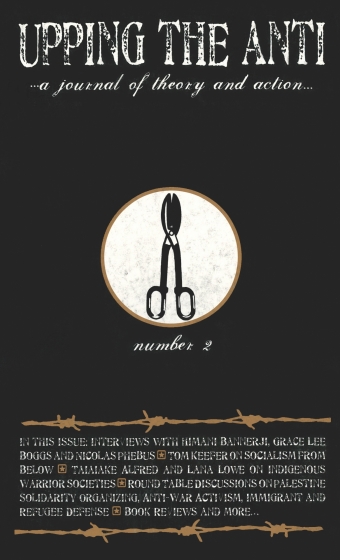Again on the "Three Antis"
The editorial of the first issue of your journal put much needed words to things I’ve long felt in not quite articulate ways. It helped clarify the roots of and to historically situate our current impasse, the challenges ahead, and what steps might be taken in addressing them. As one of the “radical social workers” you described, I am very grateful for this, because I am, for several reasons, at a personal impasse very similar to the larger one you described.
As my critique has sharpened, the number of moments in which I see liberatory possibilities has atrophied. This is at least in part due to, as stated in your editorial, a sense that our activism consists mainly of frantically jumping from tactic to tactic without spaces to develop strategy and a systematic, integrative critique of capitalism, imperialism and oppression that we can use to build our movements in effective ways. Additionally, when we actually do create such spaces we must constantly struggle against the tendencies to look at issues solely on a systemic level (neglecting issues of process and internal dynamics) or solely on a personal or interpersonal level (neglecting the systemic).
Secondly, as the organizations I work with have lost touch with larger social movement contexts and have had to fight to maintain services in the face of funding cutbacks and cooptation by the state, frontline and advocacy work has increasingly felt like trying to put band-aids onto gushing wounds. My energy is consumed with struggles to simply keep doors open, to help people find basic resources, and to bring up issues of oppression, colonialism, neoliberalism and so on in increasingly depoliticized and often even hostile internal environments. I can rarely find opportunities to examine the bigger picture or think strategically.
This all speaks to the need for balance in all we do: balancing strategy with tactics, harm reduction with resistance and dialogue/debate, addressing internal dynamics in our movements with external critique/activism and so on.
There is one specific topic around which I feel we very much need spaces of collective strategizing to explore: whenever we speak to any of the three “antis,” whether through articles or workshops or even informal discussions in mainstream, semi-politicized or radical spaces alike, the most vehement level of resistance comes up when we implicate ourselves and those with whom we are in dialogue. However, confronting privilege and complicity is absolutely crucial to the historical moment of struggle we are currently in.
In a way, social justice work is still empowering, but in a deeper, less immediately gratifying and affirming way than organizing solely around one’s victimization and exploitation by a clearly defined and identifiable enemy. We have more difficult questions than simply to ask than how can we overthrow our common oppressor.
Rather, in anti-oppression work we are asking ourselves, how do we enact privilege(s) in our daily interactions, who do our privilege(s) marginalize, how can we learn to better recognize our privilege(s) and ameliorate their effects? In anti-capitalist work we must ask how we oppose a system from within and to which we lend our energy and consent in myriad of everyday ways? And in anti-imperialist work we must ask what it means to organize for social justice on stolen land in movements in which Aboriginal people are still all but invisible? How can we build solidarity that takes into account our privileged location in a global system that funnels resources in our direction, resources we in turn use in the course of our lives and activism, despite our knowledge of the cost at which they are bought?
Many people want clear questions and answers, clear rights and wrongs, clear us’s and them’s, and we as “anti” communities cannot offer that anymore, if we ever could. We cannot offer the thrill of uncritical unity or the rush of collective self-righteousness or the simplicity of defining ourselves as good guys struggling against evil villains, as the hegemonic powers and global right do by enforcing the dominant mentality. Therefore, one of the most important questions we must ask ourselves is, where from here? Thanks for getting the conversation started.
Danielle Gauld
Vancouver, BC

